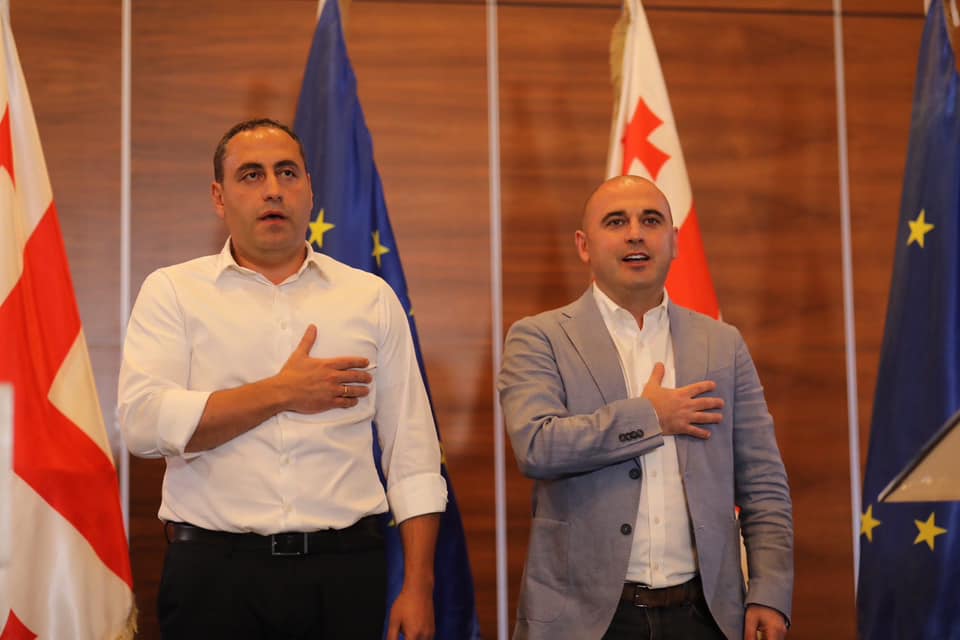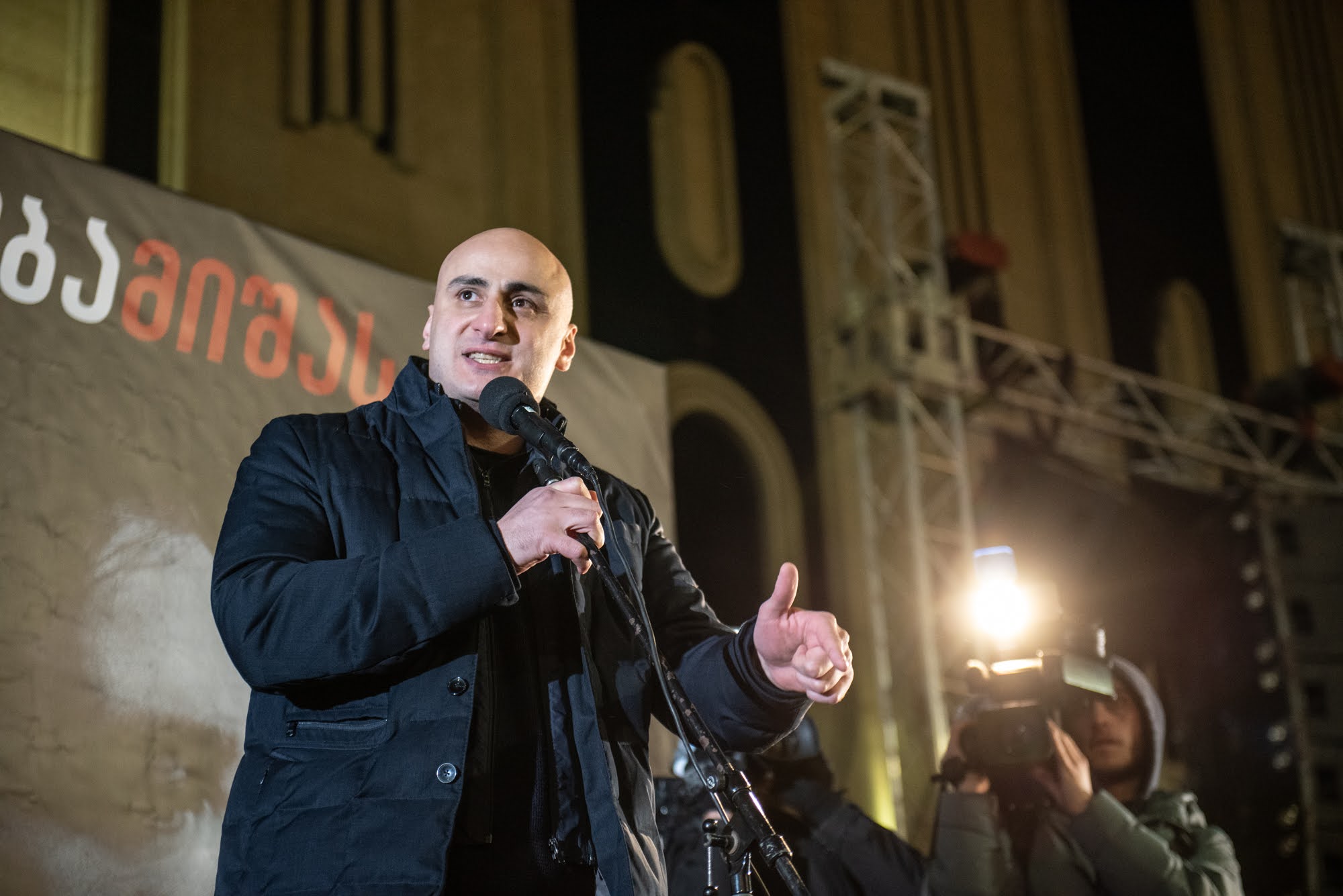
Georgia’s largest opposition party, the United National Movement (UNM), has adopted a new ‘manifesto for unity’ without the approval of several senior members, potentially deepening internal strife within the party.
The manifesto was signed during the party’s commemoration of the Rose Revolution’s 20th anniversary.
The revolution catapulted the party, then-led by Mikheil Saakashvili, the imprisoned former president of Georgia, into power until they were unseated by Georgian Dream in 2012.
The event was touted as step towards mending the party’s internal divisions created after Nika Melia lost his position as chair of the party.
Melia has since gathered supporters within the UNM, many of whom snubbed Thursday’s event and refused to endorse the manifesto, a move that potentially could further exacerbate the rift between him and the UNM’s current chair, Levan Khabeishvili.
The new 11-point manifesto reaffirmed the party’s traditional positions, such as Georgia’s commitment to its territorial integrity and pro-European path, the promotion of ‘meritocracy’ in place of corruption, and equality of all citizens under the law regardless of their ‘ethnicity, race, faith, age, or sex’.
The UNM also formally condemned Bidzina Ivanishvili, Georgia’s former prime minister and founder of the ruling Georgian Dream party, as a ‘Russian oligarch’. They also vowed not to allow an ‘uncontrolled inflow of migrants’, which was widely understood to be a reference to Russian citizens moving to Georgia in the wake of Russia’s invasion of Ukraine.
[Read more on OC Media: Datablog | How do Georgians feel about the influx of Russians?]
Melia and his supporters said that they refused to sign the manifesto because it would prevent them from criticising the party’s leadership.
Although Khabeishvili and other party leaders warned that failure to endorse the new document would result in an automatic withdrawal from the UNM, they have not officially expelled anyone, nor has Melia nor any of his allies declared their departure publicly.

During the event, the UNM showcased their pre-election coalition, the Victory Platform, which so far has only attracted Strategy Aghamshenebeli — a party founded by former UNM member Giorgi Vashadze in 2016.
Accusations of ‘informal rule’
Since coming to power as party chair, Khabeishvili’s UNM has come under fire for allegedly caving into ‘informal rule’ by former officials who served under Saakashvili, at a time when the EU expects Georgia to ‘de-oligharchise’ its politics as a pre-condition for its membership.
De-oligharchisation is often understood to refer to Ivanishvili’s own ‘informal rule’ over Georgian Dream, despite having retired from politics in 2021.
[Read more on OC Media: Georgian Government heaps praise on new Ivanishvili-linked hotel]
Since being unseated as party chair, Melia has warned party members and supporters against falling prey to the ‘informal rule’ of former UNM officials — ex-Defense Minister Davit Kezerashvili and ex-Interior Minister Vano Merabishvili.
He has accused both of being behind his removal from the party’s leadership.
Both Kezerashvili and Merabishvili have been charged with various counts of abuse of power under Georgian Dream’s rule.
[Read more on OC Media: Georgian Dream vs Kezerashvili: the end of Formula TV?]
During his tenure, Melia was believed to have kept his distance from Merabishvili and Kezerashviili, becoming publicly critical of them this year and portraying the former officials as an impediment to expanding the formerly ruling party’s voter base.
Georgian Dream has recently argued that ‘oligarchs’ like Kezerashvili were stifling Georgian politics.
Under the shadow of a jailed founder
Despite their differences, both Khabeishvili and Melia campaigned for the release of Saakashvili, who since 2021 has been imprisoned while awaiting sentencing for several counts of abuse of power.
Currently hospitalised after going on two hunger strikes, Saakashvili has been keeping tabs on Georgian politics and commenting on it on Facebook.
Over the past 18 months, Saakashvili claimed to have lost interest in Georgian politics, and then later backtracked and announced that he did not rule out becoming the Victory Platform’s candidate for prime minister in the upcoming 2024 elections.
In his written address for the Rose Revolution’s anniversary, Saakashvili rallied his supporters against the ‘oligarchy, Russia, hopelessness, and the loss of our future’.
‘We must embark on a total attack on oligarchs!’, the ex-president declared.
Melia has often contradicted Saakashvili publicly: in September 2022, he admitted that he and the former president were ‘comrades-in-arms but not friends’ and had some disagreements before. The statement came as supporters of Saakashvili accused Nika Melia of failing to secure Saakashvili’s freedom, and was followed by a leaked recording allegedly proving a wider rift between the party founder and Melia.
Several months later, Melia lost his position to Khabeishvili, who campaigned on a promise to ‘free’ Saakashvili, even if it meant breaking him out of pre-trial detention.

As the conflict between Melia and Khebeishvili escalated in recent weeks, Saakashvili scolded the former party chair on 3 November and hinted that he should have left the party. Saakashvili later seemed to strike a more reconciliatory tone, particularly towards other party heavyweights who sided with Melia.
On 24 November, the day after the party event that marked the 20th Rose Revolution, he renewed his advice to the UNM’s political council to seek the reintegration of former members.









